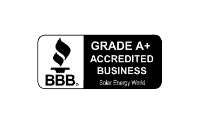
For families thinking about investing in solar energy, there may be more incentive than ever to do so. There is no doubt that the cost of energy – to cool and heat a home, not to mention for other needs – is on the way up. As inflation climbs, many people are finding it harder to maintain their lifestyle because the cost of living is on its way up. How do you lower costs and achieve your goals of improving energy efficiency?
The Inflation Reduction Act was just signed into law, and could help to target both of these core areas.
What Was in the Inflation Reduction Act?
The Inflation Reduction Act, as it is named, targets the goal of reducing growing inflation. At the same time, it promises to lower the cost of living for many families and aid in combating the climate crisis. The act is also designed to help to reduce the growing deficit. To achieve these goals, the law relies on companies to pay more of their fair share.
There are a lot of promises within the Inflation Reduction Act. For example, it promises to cut prescription drug costs, lower health care costs, and reduce spending on special interests.
One of the most important components of the act is a focus on lowering energy costs. There are several provisions within the law that make that possible. One of those allows for families to take advantage of tax credits designed to promote clean energy and electric vehicle use. That could save families as much as $1,000 per year.
There is also a direct consumer rebate available to help families who are looking to move to heat pumps or other types of energy-efficient home appliances. Tax credits for the purchase of electric vehicles are also in place.
What Does the Inflation Reduction Act Mean for Homeowners Interested in Residential Solar?
One component of the Inflation Reduction Act that is specifically interesting for those who wish to install solar energy in their homes is a key tax credit. According to information available about the law, an estimated 7.5 million more families will be able to invest in solar for their rooftops. That’s thanks to a 30% tax credit for those that take the step to do so.
In short, this tax credit allows families to save $9,000 over the life of their solar roof panel system. For families that are thinking about investing in solar energy but have not had access to lucrative savings opportunities before, this could open the door to those opportunities.
While there are some questions about how the program may work, here is a look at what we know about how the Inflation Reduction Act will help with the investment in solar panels for homeowners.
- The average family will save about $1,800 per year if they install rooftop solar. The act provides households with upfront incentives that would cover the cost of converting, which could be as high as $28,500.
What Are the Benefits?
What are the benefits of the Inflation Reduction Act, then, for those who want to install solar? First, one of the primary concerns that homeowners have in making this switch is the cost of purchasing solar panels and retrofitting their homes. This can be an initial shock and, in some cases, is out of reach. With the Inflation Reduction Act, that may no longer be the case. The act allows for an upfront amount of money to be given to the property owner, in the form of a tax credit, that would reduce that out-of-pocket expense. In that way, the act helps to make access to solar panels possible for those who may not have had that access prior.
Then, once solar panels are in place, property owners benefit right away. Remember that the use of solar panel systems can help to reduce the impact you have on the planet, but it also eliminates your high energy costs. Instead of paying for electricity from a local supplier, you are now getting your energy from the sun, and there’s no outside cost to you for doing so. In that way, this law works to reduce how much homeowners are paying month to month on their energy bills, keeping more money in their pocket on an ongoing basis.
In short, the Inflation Reduction Act offers a few key benefits:
- It provides you with a tax break so you can afford to purchase solar panels more easily.
- It helps reduce your dependence on fossil fuels, which is good for the planet.
- It works to eliminate or significantly reduce your energy costs, reducing your utility bills each month.
How Might a Homeowner Living in MD, Northern VA, PA, NJ, DE, FL, NC, or SC Work with Solar Energy World for Their Solar Installation?
The tax credit for the installation of solar panels may be available to you sooner than you think. In fact, it will cover costs incurred from the start of 2022 through the end of 2032. If you work with our team to get your solar panels installed, you could be saving money right away on that 30% tax break.
Keep in mind that how much you’ll save is dependent on the taxes you owe. It’s always wise to speak to your tax professional about the direct impact this law may have on your finances.
If you are thinking about residential solar, now is the time to act. You can switch to clean, green solar energy with the help of our team at Solar Energy World. We are happy to talk to you about the savings opportunities, the cost of installation, and how easy it can be to make this switch for your home. We offer ongoing savings opportunities and incentives to help you through the entire process.
It can seem scary to make such a big change. Yet, we’ve seen so many households wish they did it sooner. Let our team talk to you today about your home.
What Should You Do Now?
If you are thinking about solar energy for your home and want to reduce your costs, reach out to our team at Solar Energy World. You may qualify for this significant tax break and then start saving money on your electricity costs throughout the year. We can help to make that possible for you. Set up a time to discuss your needs with us and get a customized estimate to determine what you’ll save.




















